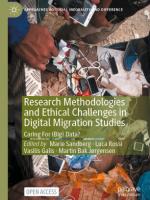The politics and challenges of conducting migration research
Researchers who conduct fieldwork among people in difficult situations are often confronted with immense hardship and ethical complexities. This is notably the case in contexts where gross inequality, poverty, violence, and physical vulnerability abound, and protective social infrastructures are inadequate and unevenly accessible.
As qualitative research is predicated on establishing trusting relationships with groups and individuals in local environments, field-based research in fragile situations and insecure places, almost by definition, means putting ourselves not only physically at risk, but also emotionally on the line. Risk of emotional distress certainly applies to migration researchers who increasingly encounter traumatic events and narratives associated with involuntary immobility or clandestine travel across borders in attempts to escape poverty, violence, or persecution.
The migrant experiences that often leave the heaviest imprint are those of migration gone terribly wrong: stories of failing in crossing the border; of being intercepted and forcefully returned along the routes; of, after years of living undocumented lives abroad, being repatriated from refugee camps or becoming “victims of human trafficking”; or stories told by relatives searching for loved ones who disappeared before reaching their destination. Failure to connect such experiences to the effect they have on our work and personal lives will inevitably affect the way we view the world and ourselves in it and, by implication, our ability to carry on producing sound research.
In a new open access book chapter, senior researcher Ninna Nyberg Sørensen discusses the particularities of doing migration research in times of stricter migration policy and practice. Special emphasis is put on the institutional cultures and structures surrounding our research, the implications of emotions in the field, and the unequal relationship between the people being studied and the local co-researchers with a view to what can be done prior to, during and after going to the field to maintain both security and emotional engagement, to “do no harm”, and to avoid occupational hazards of burnout, compassion fatigue or secondary traumatic stress among all involved.
The empirical basis for the arguments made in the chapter stems from two years of dialogue with colleagues and more structured interviews with ten selected scholars in Denmark and abroad.
The chapter is part of a Palgrave Macmillan anthology entitled ‘Research Methodologies and Ethical Challenges in Digital Migration Studies’, edited by Marie Sandberg, Luca Rossi, Vasilis Galis, and Martin Bak Jørgensen.
DIIS Experts


